ITB Hospitality Day: Innovation panel pleading a mental restart
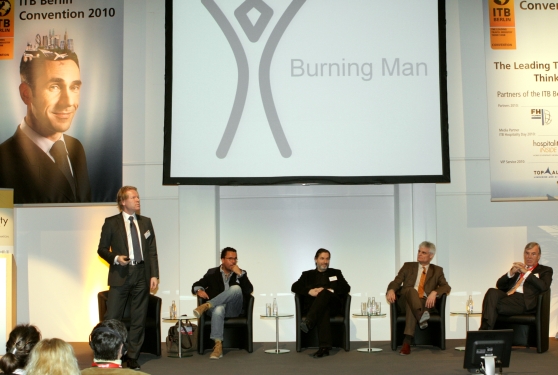 |
|
| Moderator Geoff Marée (standing) and the creative panel. / photos: map |
Berlin (March 26, 2010). When talking about innovation in almost any subject the immediate thought is to look at the influence of technology and within that broad term specifically the information technology revolution in which we live. Secondly, and especially in the physical world of the hotel environment, the effect of new designs, materials and building techniques would be considered of importance with respect to innovation. It is therefore with some credit and not a little bit of surprise that the panel discussing “Innovation: The prescription for bland hotels” at this year’s 5th "ITB Hospitality Day" during ITB Berlin barely touched on these topics preferring to focus more on the ‘software’ - the people that bring ideas to the business.
“It is the spirit of our people that drive the creativity,” espoused Christoph Hoffmann, Managing Director of The 25hours Hotel Company, a company whose three current hotels (25hours Hotel Hamburg, Goldman 25hours Hotel, Frankfurt and 25hours Hotel Frankfurt tailored by Levi’s) are notionally a brand but about as far from brand standards as it is possible to be. Each has a very different physical design make-up – the Goldman 25hours has for example over 150 different lamps in just 49 guest rooms. Each guest room, as is evident from that statistic, is individually designed to tell its own story.
What the 25hours hotels do have in common are young management teams that deliver knowledgeable, professional service with humour and discretion. And with passion. “Having worked in a strong corporate environment, I appreciate the freedom my (current) role gives me,” continues Hoffman, dressed casually, including boots from Red Wing, a brand from the Levi’s group whose European headquarters are next to the third 25Hours hotel. “Creativity is an organic process. I give our staff freedom and they become increasingly creative.”
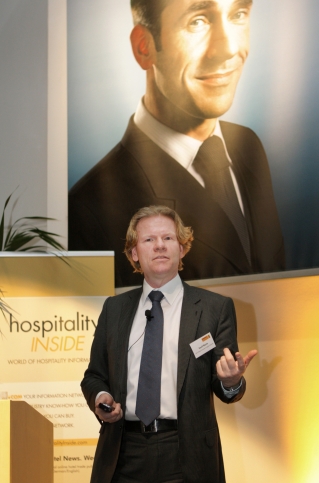 |
|
| Geoff Marée. |
Near the edge? Fall off again!
Moderator, Geoff Marée, Professor of Creativity and Design at NHTV Breda University of Applied Science in The Netherlands, referred to the design company Alessi, whose ‘mission statement’ refers to innovation and experimentation and where a major failure of a product in a market is expected every two years. “If you are near the edge then you must fall off now and then,” said Marée.
“Throw away the jacket of fear!,” agreed Michael Levie, CEO of citizenM hotels, a business with just two hotels, both in Amsterdam, but eight in the pipeline that has caused something of a sensation in the lodging industry. The multiple-award winning concept is based on a mid-market offer of small rooms, just 14 sq.m, based on the size of shipping container, stacked above a large multi-purpose Living Room that includes a canteenM, that acts as bar/restaurant, and vast lounge spaces cleverly divided to provide spaces for relaxing, meeting or working.
“We (as humans) are governed by fear,” Levie continued, “All partners in citizenM, investors, the supply chain, operations share a passion for creativity. We call it ‘putting your lights on’. Innovation is about being stupid, making mistakes. Being creative every day.”
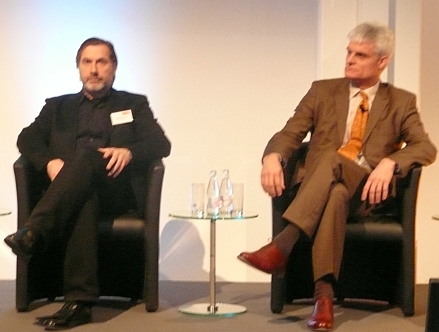 |
|
| Michael Levie (left) and Axel Donald Sauer. |
The new mantra: people, people, people
Axel Donald Sauer, Managing Director, ProLeisure Business Development GmbH, a hotelier bringing his experience to the development of leisure hotels sees the mantra of ‘location, location, location’ been replaced by ‘people, people, people’. “The boss needs to be behind the innovation and young operational staff will bring ideas,” he believes. Sauer also saw that successful hotel companies manage to link the architectural and construction initiatives with operations innovations.
Marée challenged with the rationale that as GM positions are often relatively short term, innovation was not high on their agenda. Sauer sees that change is good and recommends “forced change every six months at each hotel”. Hoffman took a more pluralistic stand, allowing GMs to become entrepreneurs and therefore adopt longer term thinking, encouraging them to push the investors to fund innovation.
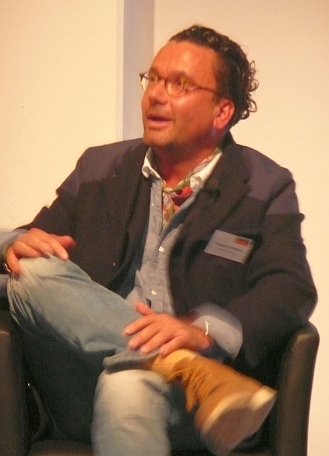 |
|
| Christoph Hoffmann. |
White wall grey? This is no innovation
Whilst admitting that with two hotels, citizenM is now a chain, and that a strong focus of the business is on consistent delivery with a ‘recognisable DNA’, Levie nevertheless acknowledged that chains ‘centralise innovation’. However Levie also emphasized that scripted etiquette, codes and greetings by staff made hotels cold and distant and was not the approach citizenM takes. citizenM recruits consistently from outside of the industry and encourages personality rather than conformity. Hoffmann argued further that ‘our DNA is in our people’ which is clear when comparing the far more varied physical hotel environment offered by the 25hours hotels to that of CitizenM.
“The hotel industry is very slow to innovative. Painting a white wall grey is seen as innovative,” summarised Levie. “We dared to start with a blank sheet of paper. We looked at all the processes and then puzzled the results of the examination together. Issues of safety and fire codes need to be dealt with …. but the rest? Throw it over board and start again,” he advised.
Without question both 25hours and citizenM have brought to the hotel market a breath of fresh air and their efforts are to be celebrated. To use Marée’s anology, they are somewhere near the ‘edge’. But being small and nimble so far neither has stumbled but equally they have not pursued aggressive expansion plans, which are clearly restricted in part by the current economic environment.
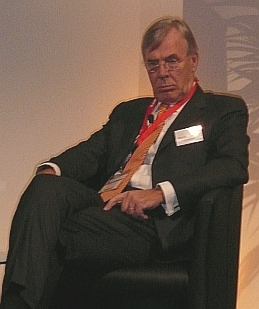 |
|
| Titus van der Werf. |
The chains'' mindset has to change
The bigger challenge is to breed a mindset of change within the large groups where the legacy of properties managed and the sheer volumes of hotels limit their ability to innovate. Shockingly the biggest innovation often cited by the development teams of such chain hotels is, at the simplistic hardware level, being the replacement of CRT televisions with flat screen TV’s or perhaps some degree of automated check in/out. Such are the restrictions they face.
The current tendency to segment the market as seen in the plethora of new brands launched by all the major hotel groups is one innovation where some will undoubtedly fail but for all its detractors is at least it is an attempt to make a change. The operators who continue to moan about the lack of suitable talent in the hotel industry and do nothing about it are the ones set for a difficult path. The recruitment, training and retention of staff are essentials for all employers; providing them with the environment in which to innovate will be the real test.
Based on a work ethic that sees 25hours with no HQ and Hoffmann’s office being ‘a bar or a train’, he proposes a low tech solution to drive innovation, “Just take the time to sit down and think”. / Guy Dittrich
To print this article you have to be registered and logged in for newsletter, visitor or subscription.





